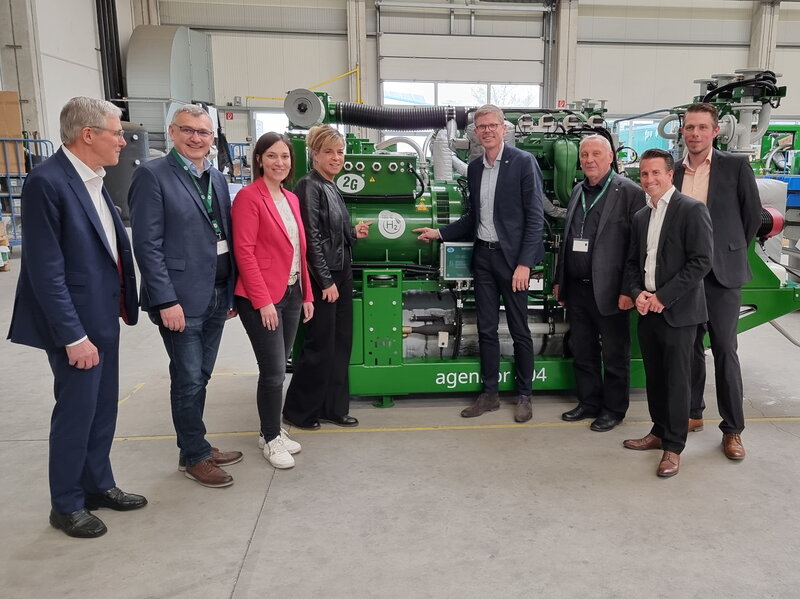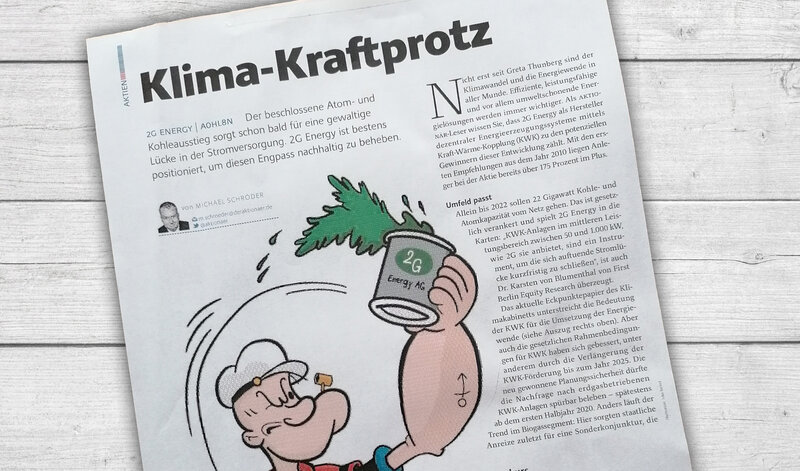Cogeneration Technology: Partner of Renewable Energies
April 28, 2023

Ensuring that at least 80% of the electricity demand be covered by renewable energies by the end of the decade is a critical target of the German government and an important promise by the three parties of the governing coalition. For the electricity supply to remain safe and stable going forward, the Ministry of Economic Affairs, which leads the way in this process, is working on a concept for a prospective power generation strategy. As far as can be deduced from the publicly known ideas, there are plans for new, gas-fueled power systems capable of running on hydrogen whose output could be around 20,000 mega-watts.
“Nuclear energy has been phased out and the end of coal as a fuel for power generation is foreseeable, new power plants fueled by gas and hydrogen that do not make use of the waste heat must only exist as a backup in case of energy shortages. The optimized local integration of cogeneration technology, however, is paramount. It is perfectly suited to ensure the necessary degree of decentralization in the energy infrastructure”, emphasizes Reiner Priggen, president of the North-Rhine Westphalian Association for Renewable Energies (LEE NRW). He adds: “Especially at the local level, cogeneration systems are a vital backup for the energy supply security and will become an even stronger backbone as the fuel transitions from natural gas to biogas and hydrogen – no matter if used by industries, to supply municipalities or to transition the local thermal energy supply.”
Priggen discussed these viewpoints with Christian Grotholt, CEO of CHP manufacturer 2G Energy, and Mona Neubaur, the North-Rhine Westphalian Minister for Economic Affairs, Industry, Climate Protection and Energy. She visited the company headquarters of 2G Energy in Heek back in April. “This visit by the Minister for Economic Affairs proves to us that the government of NRW is completely aware of the significance of cogeneration for the transformation of the power supply infrastructure and the local thermal energy transition, which we see as an important signal”, emphasized Grotholt after the meeting. The head of 2G Energy also pointed to the growing importance of cogeneration technology for the region as a hub for industry and energy: “Due to the political backing for heat pumps and electric mobility, industrial operations still require an immense connected load while the grid expansion continues to fall behind. In this context, cogeneration technology is the ideal remedy as the perfect partner of photovoltaics.”
Since being founded in the 90s, 2G Energy has become a leading CHP provider in the state and the country. The power generation units can be fueled by a variety of gases to produce electricity and heat. Today, 25 units are already fueled by hydrogen. 2G Energy is a member of the LEE NRW.
During the visit by Neubauer, whose ministry also oversees climate protection, Grotholt emphasized the technical maturity of cogeneration technology which already makes it an ideal complement to the synergy of photovoltaics and heat pumps: “From industrial operations over housing associations to district heating solutions: decentralized cogeneration combined with renewable energies makes for the most efficient solution to restructure our energy infrastructure.”
Minister Neubaur underlines that the state of North-Rhine Westphalia as a preeminent center of cogeneration will continue to back the technology: “For the state of NRW it is vital to think of the energy supply infrastructure in holistic terms, including climate neutrality, cost efficiency and security of supply. In this context, cogeneration systems are already a vital pillar of the electricity and heat supply. In our state alone, there are more than 10,000 combined heat and power units of all sizes that ensure an efficient energy supply for municipalities and industrial operations. Combined heat and power systems will continue to play a critical role in the future energy system. Besides covering the residual load, the capability of cogeneration technology to run on green gases will be an essential part of a climate friendly heat supply. Furthermore, combined heat and power systems can operate in complete independence of the current heat demand when combined with heat storage solutions and heating networks.”
As far as the Association for Renewable Energies of NRW is concerned, the potential of cogeneration technology in the context of transitioning the local thermal energy supply is not even close to being fully exploited. Therefore, the LEE NRW will host the first Thermal Energy Congress for NRW this year to present solutions and ideas. The date and place are already decided: September 21 in Münster. Further details will be communicated over the coming weeks.

